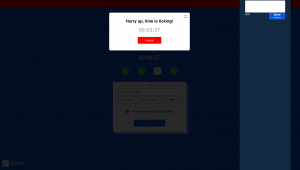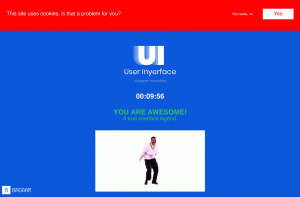Bagaar’s online game User Inyerface
First attempt:

This was a very annoying activity. This is how far I got into it with a six year old bugging me to explain what I was doing and interrupting me because she wanted to play. I quit here, took a screen shot, and decided to return to the activity when I had more time and less distractions.

Here is my screen shot from this evening (my previous attempt was a couple days ago). I was able to close the door on my studio/office and focus on following the directions posted on the screen. I had gathered from my previous start to this assignment, and from the readings this week, that it would be important to read carefully, rather than scan the pages. The running timer made me feel like I needed to be going faster, as did the text at the beginning that instructed me to go as quickly as possible. This inevitably caused me to miss some obvious instructions and make me feel as though I wasted a lot of time – especially when repeatedly checking the boxes in the last exercise, as it took me a couple tries to realize that I needed to scroll up to select them all.
This gamification, through use of a timer and moving through tasks, reminded me of how Tristan Harris talked about the, “…race for our attention,” in his TED talk (2017). Bagaar’s use of the recurring pop-up timer perfectly illustrated Harris’ explanation of how notifications schedule our thoughts. I was able to forget about the timer, read instructions and make headway; then that timer would pop back up, my heart would race and I would have to close it before returning to the ongoing and seemingly unrelated task.
The other place in this game where I felt that I ‘lost time’ was simply that it was about entering my personal data. I have many autofill options saved into my computer, but with Dr. Tufekci’s TED talk (2017) fresh in my mind, I was feeling hyper-vigilant about not putting my exact details in. In fact, she so clearly explained persuasion architecture that I am much more nervous about the learning algorithms that have already collected my personal data and I’m worried about what, beyond marketing, that it will be used for in the future. How often are my political views manipulated? How much weight do I give opinions that are shared by my “friends”?
And, most importantly, how might I use what I have learned this week about notifications scheduling thoughts to benefit the students in my classroom?
References
Harris, T. (2017). How a handful of tech companies control billions of minds every day. Retrieved from https://www.ted.com/talks/tristan_harris_the_manipulative_tricks_tech_companies_use_to_capture_your_attention?language=en
Tufekci, Z. (2017). We’re building a dystopia just to make people click on ads. Retrieved from https://www.ted.com/talks/zeynep_tufekci_we_re_building_a_dystopia_just_to_make_people_click_on_ads?language=en (Links to an external site.)
